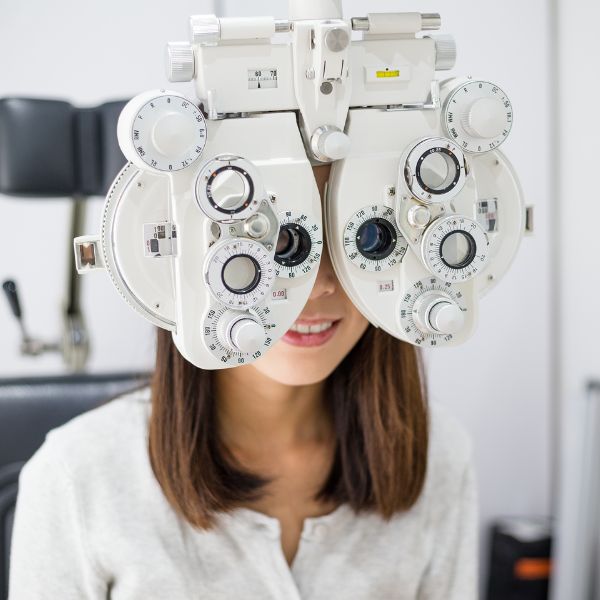Frequently Asked Questions
What Is Glaucoma?
Glaucoma is a group of eye conditions that can damage the optic nerve, which is essential for transmitting visual information from the eye to the brain. The main risk factor for glaucoma is increased intraocular pressure (IOP), resulting from fluid buildup within the eye. However, glaucoma can also occur with normal or even low IOP. If you think you have glaucoma, see your eye doctor for a diagnosis.
What Are The Risk Factors For Developing Glaucoma?
Glaucoma can affect anyone, and while it’s more common as people age, even 1 in 10,000 babies can be born with it. Several factors can increase your risk:
Age: Over age 60, your risk of glaucoma is six times higher.
Family history: A family history of glaucoma makes you about six times more likely to develop the eye condition.
Steroid use: This includes medications like prednisone for various treatments.
Previous eye trauma: Even injuries from sports like baseball and boxing can increase risk, whether immediately or years later.
Certain health conditions: Diabetes, hypertension, and migraine headaches are associated with a higher risk.
High myopia (nearsightedness): This condition can also increase your risk of developing glaucoma.
How Is Glaucoma Treated?
If you are diagnosed with glaucoma, effective treatments are available to preserve your vision. The primary objective of glaucoma treatment is to reduce intraocular pressure (IOP) and halt optic nerve damage. Various treatment options are available, including eye drops, laser therapy, and surgical interventions.
What Are The Symptoms Of Cataracts?
Cataracts can develop in one or both eyes and may progress at different rates. Some common symptoms of cataracts include:
- Blurred or cloudy vision
- Difficulty seeing in low-light conditions
- Increased sensitivity to glare from lights
- Fading or yellowing of colors
- Double vision in one eye
- Dimmed vision
When Is The Right Time For Cataract Surgery?
You should consider cataract surgery when your reduced vision starts to impact your daily life. If it affects your work, driving, reading, or other activities, it might be a good idea to consider surgery. Remember, cataracts don’t harm the eye; it is suggested to opt for surgery only if you want to improve your vision.
How Successful Is Cataract Surgery?
Cataract surgery is highly successful, improving most patients’ vision and quality of life. However, it carries risks such as infection or retinal detachment, which our eye surgeons will discuss before proceeding. While options like eyeglasses or contact lenses can temporarily improve vision, cataracts will eventually progress, and surgery may become necessary to improve your vision. Consult our eye care professionals if you suspect or have been diagnosed with cataracts to determine the best treatment plan for your situation.
What Is Cornea Transplant Surgery?
A corneal transplant, or keratoplasty, involves replacing a damaged or diseased cornea with a healthy cornea from a deceased donor. The donor cornea is carefully prepared and secured into place with sutures or adhesive. While cornea transplants are generally safe and successful, there are potential risks like graft rejection or infection, requiring post-operative care and follow-up visits for monitoring.
Can A Retinal Tear Be Treated?
A retinal tear is a rip in the retina, usually caused by the vitreous tugging on it. This frequently happens as people get older or due to trauma. When the retina tears, it can happen at the outer edges, leading to fluid getting beneath it. This fluid can then cause the retina to detach.
When retinal tears are detected early, they can be addressed using methods like laser treatment. These approaches effectively seal the retinal breaks and help prevent detachment. If a retinal detachment does occur, treatment options include in-office surgery, laser procedures, or more intricate surgical interventions performed in the operating room.
What Is Macular Degeneration?
Macular degeneration is an age-related eye condition that causes progressive damage to the macula, resulting in central vision loss. Treatment options for macular degeneration include medications, laser therapy, and in some cases, injections to slow down its progression and preserve remaining vision.
What Are Eye Floaters?
Eye floaters are small, often transparent, spots or squiggles that seem to float in your field of vision. While most cases do not require treatment and usually resolve on their own, it is essential to have a comprehensive eye examination to rule out any severe underlying conditions and receive appropriate care if needed

